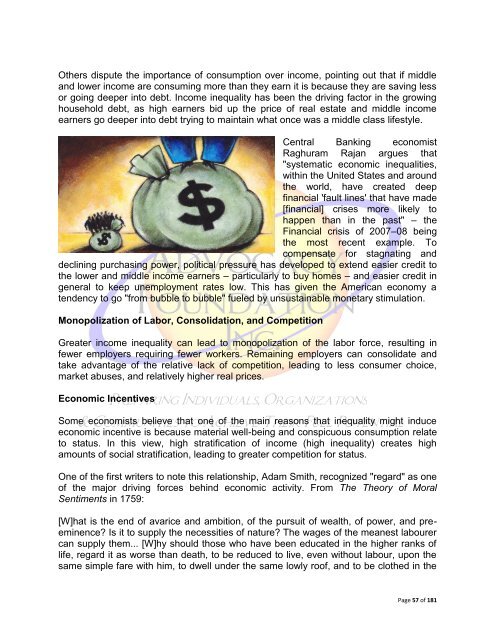You also want an ePaper? Increase the reach of your titles
YUMPU automatically turns print PDFs into web optimized ePapers that Google loves.
Others dispute the importance of consumption over income, pointing out that if middle<br />
and lower income are consuming more than they earn it is because they are saving less<br />
or going deeper into debt. Income inequality has been the driving factor in the growing<br />
household debt, as high earners bid up the price of real estate and middle income<br />
earners go deeper into debt trying to maintain what once was a middle class lifestyle.<br />
Central Banking economist<br />
Raghuram Rajan argues that<br />
"systematic economic inequalities,<br />
within the United States and around<br />
the world, have created deep<br />
financial 'fault lines' that have made<br />
[financial] crises more likely to<br />
happen than in the past" – the<br />
Financial crisis of 2007–08 being<br />
the most recent example. To<br />
compensate for stagnating and<br />
declining purchasing power, political pressure has developed to extend easier credit to<br />
the lower and middle income earners – particularly to buy homes – and easier credit in<br />
general to keep unemployment rates low. This has given the American economy a<br />
tendency to go "from bubble to bubble" fueled by unsustainable monetary stimulation.<br />
Monopolization of Labor, Consolidation, and Competition<br />
Greater income inequality can lead to monopolization of the labor force, resulting in<br />
fewer employers requiring fewer workers. Remaining employers can consolidate and<br />
take advantage of the relative lack of competition, leading to less consumer choice,<br />
market abuses, and relatively higher real prices.<br />
Economic Incentives<br />
Some economists believe that one of the main reasons that inequality might induce<br />
economic incentive is because material well-being and conspicuous consumption relate<br />
to status. In this view, high stratification of income (high inequality) creates high<br />
amounts of social stratification, leading to greater competition for status.<br />
One of the first writers to note this relationship, Adam Smith, recognized "regard" as one<br />
of the major driving forces behind economic activity. From The Theory of Moral<br />
Sentiments in 1759:<br />
[W]hat is the end of avarice and ambition, of the pursuit of wealth, of power, and preeminence?<br />
Is it to supply the necessities of nature? The wages of the meanest labourer<br />
can supply them... [W]hy should those who have been educated in the higher ranks of<br />
life, regard it as worse than death, to be reduced to live, even without labour, upon the<br />
same simple fare with him, to dwell under the same lowly roof, and to be clothed in the<br />
Page 57 of 181

















